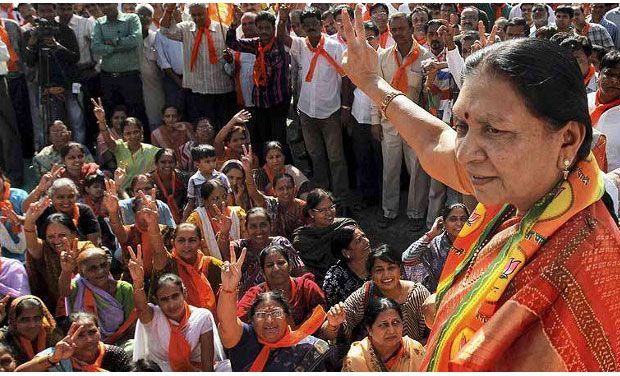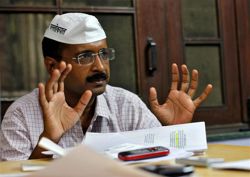
Chief Minister Anandiben Patel
Manas Dasgupta
The Gujarat Government has been caught between the devil and the deep sea in implementing a measure close to the heart of Prime Minister Narendra Modi but is wrought with the threat of inviting people’s wrath if enforced too strictly.
Modi’s successor as the Chief Minister, Anandiben Patel has already announced the state government’s “policy decision” to enforce the “Gujarat Local Authorities Laws (Amendment) Act, 2011”, making voting “compulsory” in the elections to the local self-government bodies that would include six municipal corporations, 253 municipalities, 26 districts and 208 taluka panchayats scheduled before the end of this year. The measure also provides for punitive action against those failing to vote without prior permission from the authorities concerned showing “valid reasons” such as hospitalisation or other emergency causes for absence.
The implementation of the compulsory voting in the local elections has become a prestige issue for the BJP government, particularly because it was vehemently opposed by the Congress on the ground of it being ultra virus to the Constitution which has guaranteed freedom to the citizens in exercising their voting rights, and also because Modi as the CM had mooted the idea and rode over the Opposition storm to get it through in the state Assembly and finally as the PM ensured the Governor’s assent to the Bill that was pending since the UPA government appointee occupied the state Raj Bhavan.
But the government is now worried over framing by-laws specifying quantum of punishment for failing to report to the polling stations without prior permission. A realisation has dawned on the government and the ruling party that strict enforcement of the measure could invite voters’ wrath who might consider it an infringement on their freedom to vote, while lighter punishment could reduce the entire move to a farce and ignored by voters. At stake is the entire basic democratic structure which the state BJP can ill-afford to risk particularly after the party’s main vote-catcher left the state for Delhi.
As far as the administrative machinery is concerned, the state government claimed to be ready in implementing the measure. The average voting percentage in the local body elections was around 70 but compulsory voting should take it beyond 90 per cent if not 99 per cent. For that, the government would require more electronic voting machines (order for which, it claimed, has already been placed), more manpower to conduct elections, increase the number of polling booths and perhaps also extend the voting timings to accommodate all voters.
Even if it can resolve the administrative problems, the Patel government is wary of voters’ adverse reaction to the measure. It not only appointed a committee under retired IAS officer KC Kapoor, who also was a former chief of the state election commission, to assess opinion of a cross section of the voters, it also held a series of meetings with senior ministers, bureaucrats and the election officers in formulating the bye-laws quantifying punishment for “absence without leave” in casting votes.
The government, and the ruling party, are learnt to be in favour of letting go unpunished the “first-time offender” except issuing a customary notice for not casting their votes, the repeat offenders be punished with nominal fines but in case the same persons failed to cast their votes the third time, they be punished severely, including withholding basic civic facilities to them. The government is also in favour of preparing a long list of “exemption category” so that a large number of wilful defaulters go unpunished without voting.
Though Gujarat is all set to emerge the first state in the country to make voting “compulsory” to proudly call itself “the champion of democracy,” it is almost certain to dilute the punishment clauses to the maximum possible extent not to yield ground to the Congress in the local elections by default.



























